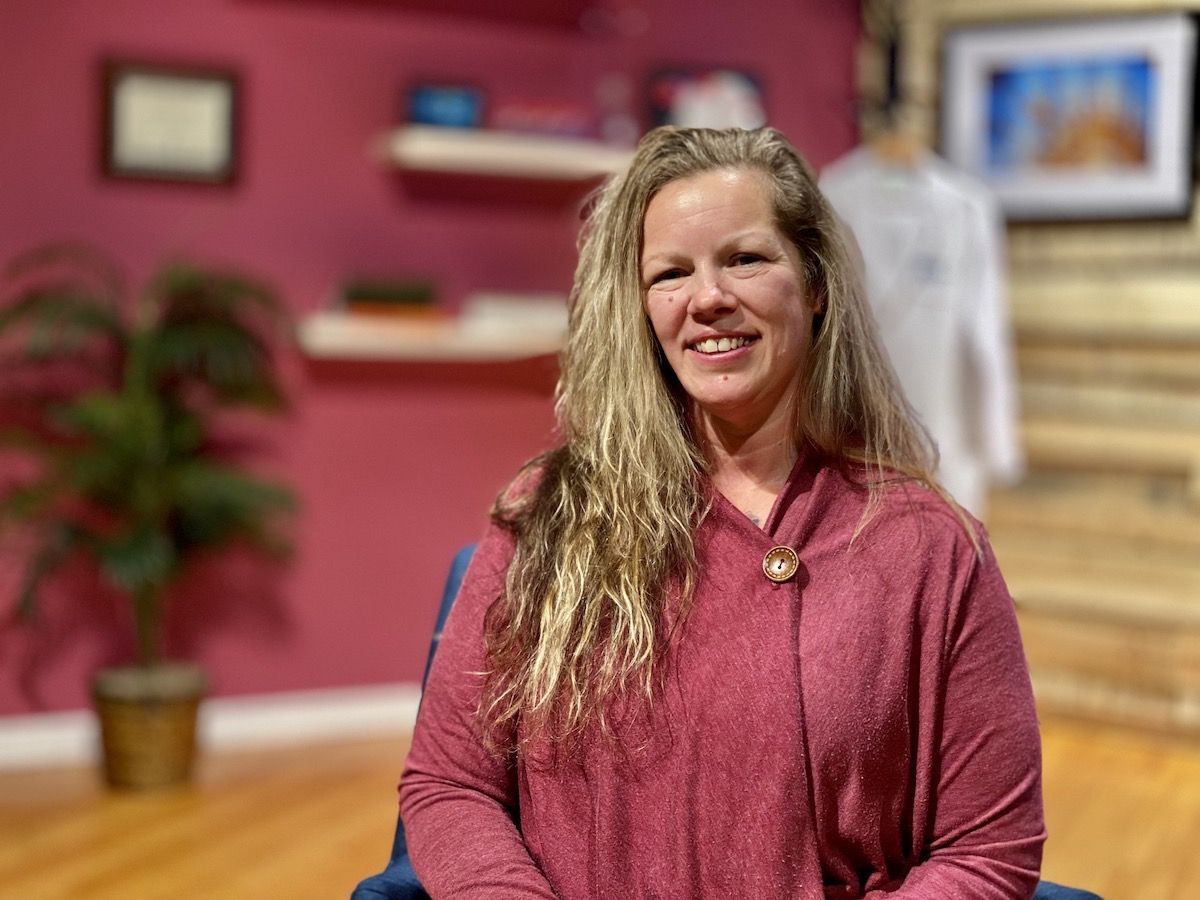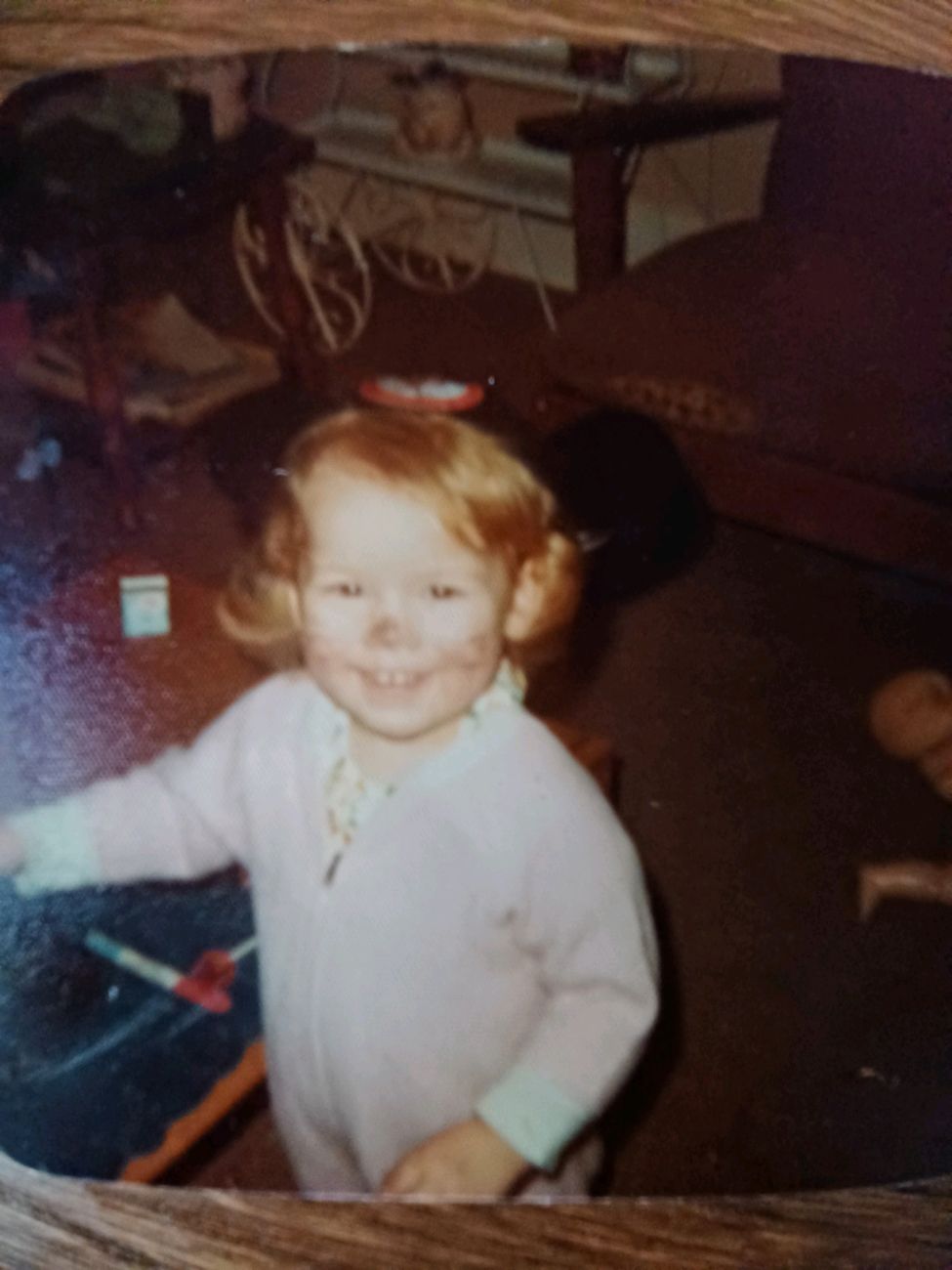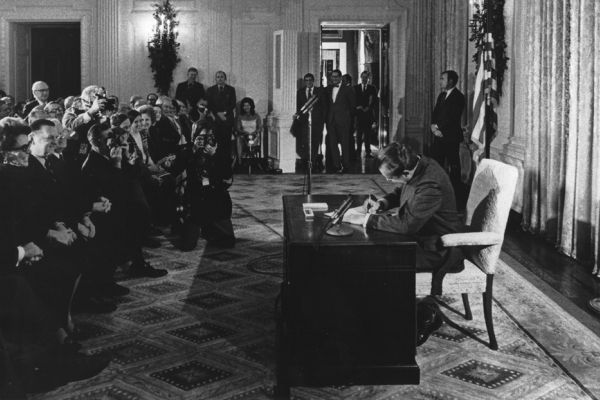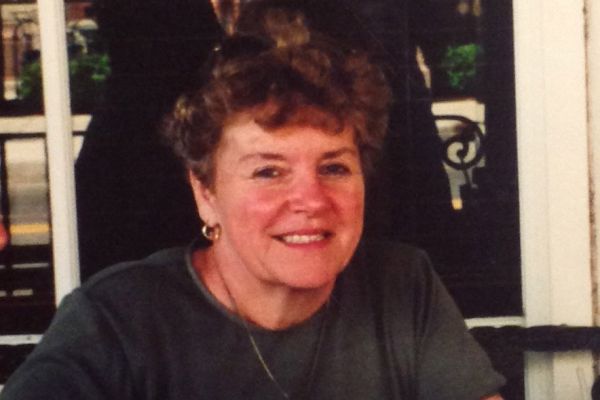In 1971, Congress passed the National Cancer Act and made the fight against cancer a national priority. To mark the 50th anniversary of the National Cancer Act, we'll be highlighting important moments, people and innovations from our 120-plus-year history that have impacted the world of cancer and beyond.
To learn more about the NCA and our role as one of the first designated comprehensive cancer centers visit: RoswellPark.org/WeSetTheModel
In 1977, Stacey Smith began treatment for rhabdomyosarcoma at what was then called Roswell Park Memorial Institute. At 3 years old, Stacey didn’t know or care that Roswell Park had played a pivotal role in the creation of the National Cancer Act just a few years earlier and was one of three cancer hospitals that set the model for National Cancer Institute-designated cancer centers.
Rather, what Stacey remembers caring about then were the boxes of animal crackers given to pediatric patients, giggling with her favorite nurse as they playfully referred to each other as “Chicken” and getting to see the ducks in the pond that used to be on the Roswell Park grounds. She fondly remembers Dr. Daniel Green, a pioneer in pediatric oncology who treated Stacey from 1978 to 2008. And she remembers being a fighter. “It often took two or three nurses to hold me down when I was examined.”
Now, at age 47, Stacey still receives treatment at Roswell Park Comprehensive Cancer Center, and from her adult perspective, she has come to appreciate so much more about how both she and Roswell Park have grown and improved over the years.
Collaborative care for pediatric patients
Nearly 46 years ago, Stacey’s mother noticed a lump on her daughter’s right cheek. “My mom took me to my pediatrician who ran some tests and referred me to a pediatric surgeon at Children’s Hospital on Hodge Street in Buffalo.” Two masses were surgically removed from Stacey’s jaw and cheek and determined to be rhabdomyosarcomas, a rare soft tissue cancer. Two weeks later, Stacey’s cheek became swollen again as the sarcoma began to regrow. At that point, Stacey was referred to Roswell Park, where she underwent both chemotherapy and radiation.
At the time, Stacey benefitted from one the early hallmarks that helped Roswell Park earn distinction as one of the first NCI-designated comprehensive cancer centers: collaboration in clinical care, research and education. While many of Roswell Park’s pediatric specialists also served on the staff of Children’s Hospital of Buffalo and the State University of New York at Buffalo (UB) School of Medicine over the years, this collaborative effort took a huge leap forward in 2019, when the newly named John R. Oishei Children’s Hospital (OCH) relocated near Roswell Park’s main campus and UBMD Pediatrics, facilitating the creation of the Roswell Park Oishei Children’s Cancer and Blood Disorders program.
A series of bridges connect Roswell Park’s and OCH’s main buildings today, allowing pediatric patients, their families and medical personnel easy access between outpatient chemotherapy, infusion treatments and radiation therapy at Roswell Park’s Pediatric Hematology Oncology Center and inpatient care for surgeries, blood and marrow transplants and critical care at Oishei. Both institutions offer specialized psychosocial services including child life specialists, social workers and pediatric mental health specialists.
Multidisciplinary care over the years
After two months of radiation and chemotherapy at age 3, Stacey’s tumor was gone. But that didn’t mean she was done with treatment at Roswell Park. “I was monitored by Roswell Park for several years and, fortunately, the sarcoma never returned,” Stacey says. However, the radiation and surgery had caused some damage to her teeth and mouth.
“I was treated by Roswell Park’s pediatric dentistry and oral health department during the '70s. As I got older, I stopped going to Roswell Park for my dental work and had my routine cleanings done at a local dentist,” she recalls. “I knew I needed some dental work, but I was scared. Then, as an adult, I really began to have problems with my teeth because of the scarring, decay and instability of my jaw. One of the dentists I saw had interned at Roswell Park and he recommended that I return there, as they would be much more experienced in addressing my treatment-related dental issues. In 2009, the dentists in Roswell Park’s Dentistry and Maxillofacial service worked on my jaw, extracted some damaged and fused teeth and fitted me with partial dentures, and I have not had any dental issues since then,” Stacey says. She continues to go to Roswell Park for regular dental check-ups and cleanings. “I feel safe when I am there. I trust them and know I am getting the proper care.”
Stacey is also an advocate for regular cancer screenings and second opinions at Roswell Park. “Unfortunately, cancer has impacted far too many people in my family. I was 27 when my mother died from stomach cancer. I often wonder if my mother would have survived longer if she’d gotten regular screenings and had chosen to be treated at Roswell Park. My father died of lung and skin cancer four years ago, at age 66. Both of those experiences were real wake-up calls for me to never skip those all-important routine exams and screenings, including Pap smears and mammograms,” Stacey says. “When I had an abnormal Pap smear, of course I chose to go to Roswell Park for my biopsy.”
Healing physically and emotionally
While Stacey has many good memories of her 45 years of care at Roswell Park, she also admits that in hindsight, many of her experiences with cancer caused more trauma than she realized.
“I have some fond memories of my early years as a cancer patient, but I also remember that the treatment meant I had to be poked and prodded and I had to hold still during radiation. Those are both very tough things for any 3-year-old to deal with,” she says. “As the years went on, I was teased and bullied in school because of the scar and slight deformity caused by the surgery to my jaw. Some kids called me ‘cancer face.’ I became so unhappy and rebellious that I quit high school. I didn’t take good care of myself physically or emotionally for a long time.”
Eventually, Stacey, the self-described “fighter,” dug deep into her soul to help heal her trauma. “I went to business school and 16 years ago I started a house cleaning business which I continue to run. Then, eight years ago, I started going to yoga classes. I became much more aware of how I nourished myself, physically and emotionally. I started working with a nutritionist, doing research, eating ‘clean’ whole foods, and eliminating refined sugar, gluten and processed foods from my diet. I lost 50 pounds, but I also learned to love myself the way I am. I learned that rest, gratitude and movement made me more content and stronger.”
Stacey becomes emotional when she describes one of her father’s last acts of kindness. “He lived with me for the last 14 months of his life. He saw how much I wanted to improve the lives of myself and my children, and he told me he would pay for me to go to school to become a yoga teacher.” Four years ago, Stacey fulfilled that dream and now teaches classes throughout the Niagara Falls area as well as at her own yoga studio.
Stacey expresses gratitude to Roswell Park too, as it continues to improve its services to help survivors. “I am so glad to see that Roswell Park now offers patients and survivors access to yoga, nutritionists, psychologists, integrative medicine, acupuncture, massage, spiritual care, art and so many other ways to help them heal both physically and emotionally.”
We Set the Model
50 years as an NCI-designated comprehensive cancer center and more than a century leading the way. Learn more about Roswell Park's place in history as we became a model for other cancer centers around the world.
Learn MoreWords of advice and hope
As she reflects on her nearly half century of treatment at Roswell Park, Stacey offers some words of advice and hope. “I would tell anyone who has gone through cancer treatment to utilize the tools that are now offered to patients to help themselves heal. Learn what helps you decrease your stress, be it meditation, exercise, music, nature, art, cooking, spending time with your family, or whatever works for you. Try to stay in the moment and find gratitude every day, even when things are hard. We can’t control the past, and we don’t know what the future will bring, so try to be grateful for the things that make you smile now.”
To that end, Stacey lists one thing for which she is forever grateful. “Roswell Park helped heal me over the years, and for that I am so thankful. I am happy to share my story of healing with others. I now know that I have a purpose and there’s so much more here for me to do.”
Editor’s Note: Cancer patient outcomes and experiences may vary, even for those with the same type of cancer. An individual patient’s story should not be used as a prediction of how another patient will respond to treatment. Roswell Park is transparent about the survival rates of our patients as compared to national standards, and provides this information, when available, within the cancer type sections of this website.




